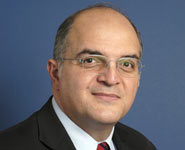The study, led by Professor Raimondo Ascione, Chair of Cardiac Surgery & Translational Research in the School of Clinical Sciences at the University of Bristol, is published online in Stem Cell Reviews & Reports.
The study, funded by the British Heart Foundation (BHF) and the National Institute for Health Research (NIHR), found that it is possible to expand up to seven-fold, in vitro, rare stem cells (called CD133+) from human cord blood and then grow them into cardiac muscle cells.
The findings could have major implications on future treatment following a heart attack given that cells obtained from adults following a heart attack may be less functional due to ageing and risk factors.
Professor Ascione said: “We believe our study represents a significant advancement and overcomes the technical hurdle of deriving cardiac muscle-type cells from human cord blood. The method we have found has the attributes of simplicity and consistency. This will permit more robust manipulation of these cells towards better cell homing and cardiac repair in patients with myocardial infarction.
”Our research suggests that in the future stem cells derived from cord blood bank facilities might be used for repair after a heart attack.”
The study focused on a rare type of stem cells, called CD133+, which is also present in adult bone marrow. There is also strong experimental evidence these cells derived from bone marrow may help with the regeneration of damaged heart muscle.
Professor Jeremy Pearson, Associate Medical Director at the British Heart Foundation, said: “Regenerative medicine research in the lab, alongside studies of patients, is absolutely crucial. Right now, the damage to the heart caused by heart attack cannot be reversed. Through research like this across the UK, we hope to bring our vision of mending broken hearts to reality.
“There has been interest for some time in the potential use of blood from the umbilical cord as a source of stem cells for therapy in a variety of diseases. This study has shown for the first time that it’s possible to turn cord blood stem cells into cells that look like heart muscle, in the lab. The results are encouraging, but there are still lots of questions to answer before we’ll know whether these cells can be used successfully for heart repair in patients.”
In 2007, the British Heart Foundation (BHF) awarded Professor Ascione, over £200,000 for the world’s first clinical trial, TransACT, to test whether bone marrow derived CD133+ stem cells can repair heart muscle cells damaged by a heart attack. Recently, funding for the trial has been extended to 2013.
The double blind placebo-controlled trial has successfully recruited 50 per cent of its patients with no safety concerns. Under Professor Ascione’s leadership, 31 out of 60 patients, who have suffered a major heart attack, have been injected to date at the Bristol Heart Institute with stem cells from their own bone marrow or a placebo into their damaged hearts during routine coronary bypass surgery.
Paper: A new methodological sequence to expand and transdifferentiate human umbilical cord blood derived CD133(+) cells into a cardiomyocyte-like phenotype. Cui YX, Kafienah W, Suleiman MS, Ascione R. Stem Cell Reviews & Reports, published online ahead of print, 21 September 2011.
